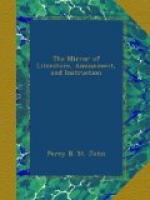(From a piquant, rambling paper in Fraser’s Magazine.)
We arrived at Otaheite just in time to witness the funeral ceremonies of the pious chief Omaree. He was lying in state at his house above the harbour where we landed, and we were invited to assist at the obsequies. His viscera were removed, and his remains, properly speaking, were laid on an elegant palanquin or hanging bier, highly perfumed; around which, and through the apartment, odorous oils were burning. Several of his old friends came to see him, and complimented him highly on the state of his looks and his good condition in various respects. They presented him with numerous and tasteful gifts, which they assured him were sincere tokens of their esteem, and hoped he would accept them as such. Omaree replied by the mouth of an old priest who acted as master of the ceremonies—assuring the good company, in return, that he was “as well as could be expected,” felt particularly flattered by the kind attentions of his friends and visiters, and hoped they would make themselves quite at home. “By the hand of my body,” exclaimed the captain, sitting down to a bowl of fresh Palmetto wine, and lighting a pipe at the foot-lights, “this is the dacentest wake I ever came across out of Ireland! Noble sir, your good health and snug lying to you!”
After a conversation with Omaree on various interesting topics, his friends and family proposed taking him to see his property in another part of the island: he gratefully assented to the proposition, and requested the good company to avoid fatiguing themselves by travelling too rapidly, as he was in no hurry to leave them. He was then borne in state for some miles, preceded by dancers, singers, knuckle-drummers, strewers of flowers and leaves, &c., to a pretty spot by the sea-side, where he had lately made a tobacco-plantation, and which, he remarked, “would be scarce worth the plucking, as he had not been able to attend to it of late;—however, he hoped his venerable and disinterested friend and spiritual comforter, the priest, would accept the crop, such as it was, as a slight testimony of his eternal gratitude.” Hereupon the crowd clapped their hands with delight, the singers shouted, the drummers thumped, and the dancers vaulted their admiration of the piety and generosity of Omaree.
Here he was placed in an easy sitting posture, in a commodious arm-chair that commanded a view of the plantation and the Pacific; where, sheltered from the meridian sun by a lofty arbour of the climbing cobea and wild vine tastefully trained through a cluster of cocoa-palms, he was invited to witness a dramatic representation containing incidents which they knew his memory reverted to with pride and pleasure. This drama, in which a great company of performers took part, was carried on with much taste and spirit. The old priest undertook to translate the most interesting passages for my edification (still acting as the mouthpiece of his deceased friend), with the exception of a few “love-passages,” as Queen Elizabeth would have called them, the import of which was sufficiently perspicuous without verbal comment.




